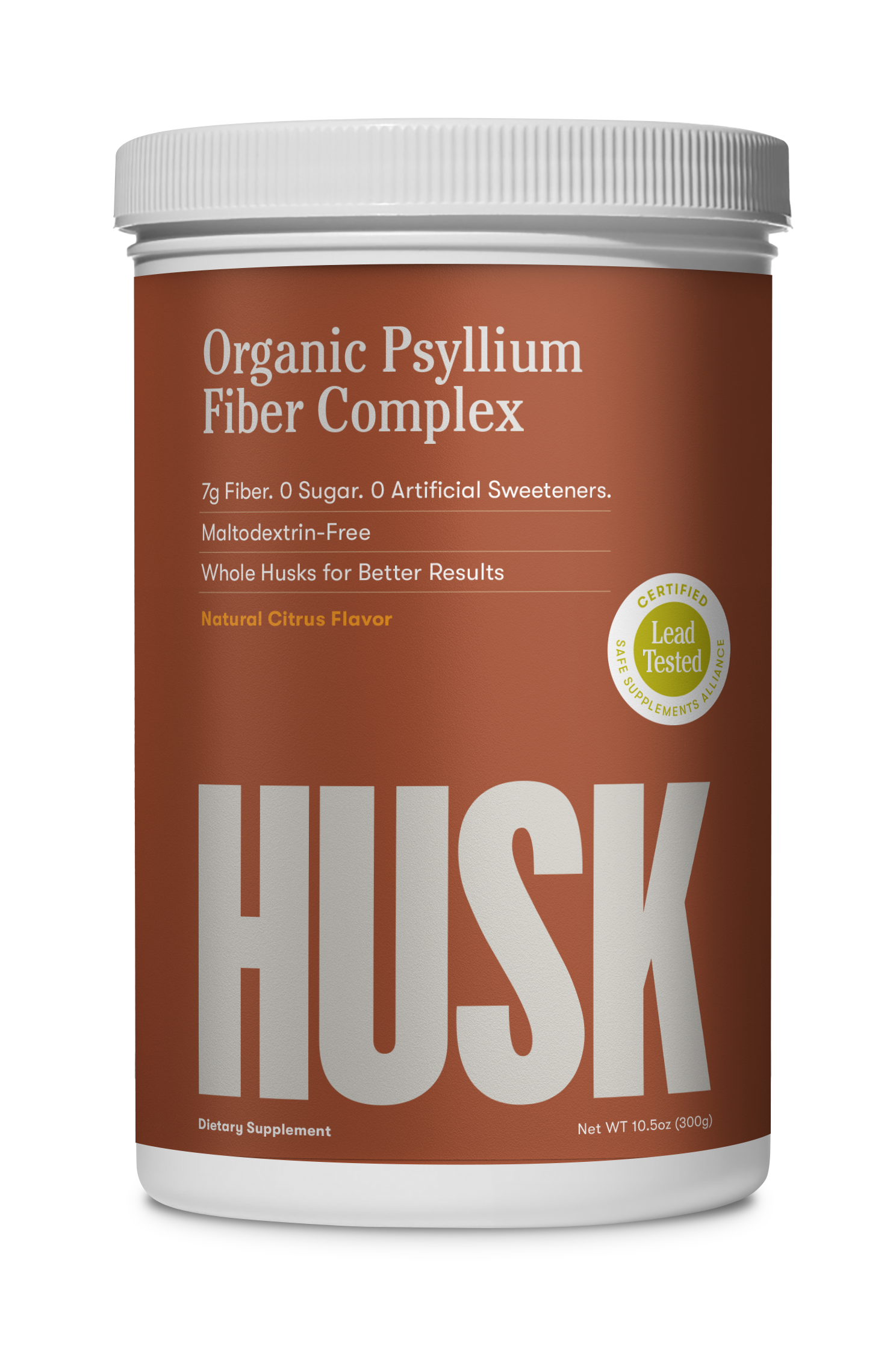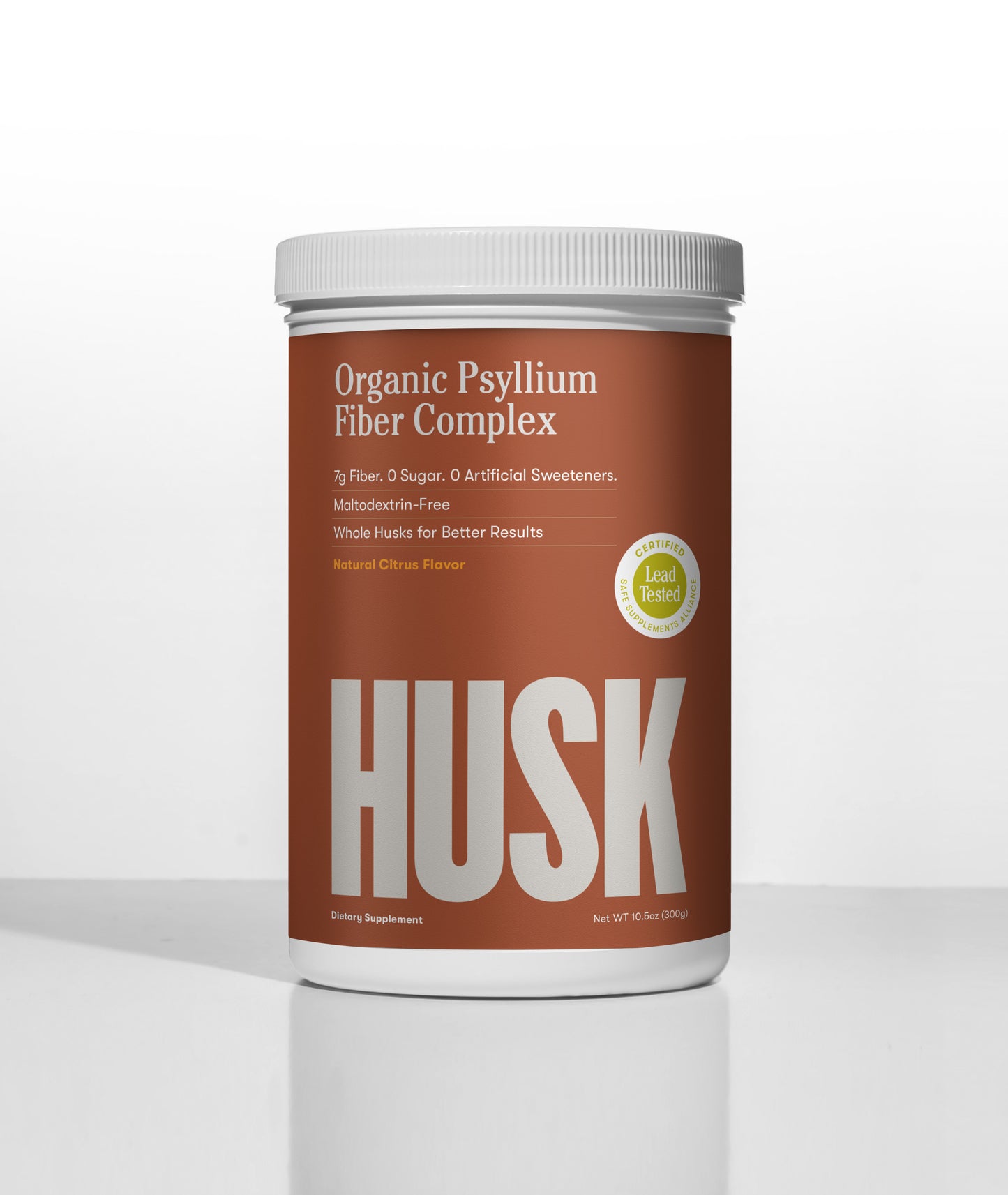Psyllium vs. other fibers
Psyllium
Methylcellulose
Wheat Dextrin
Constipation benefit
Best
Average
Good
Fermentable (potential gas/bloating)
No
No
Yes
Natural or synthetic
Natural
Synthetically modified form of cellulose
Synthentically processed from wheat
Cost to produce
Moderate
Cheap
Cheap
Lowers cholesterol*
Yes
No
No
Regulates blood sugar levels*
Yes
No
No
* These statements have not been evaluated by the Food & Drug Administration. This product is not intended to diagnose, treat, cure, or prevent any disease.
The problem with psyllium
Psyllium is often not clean. Organic psyllium doesn’t mean safe.
Psyllium, whether organic or not, contains lead and other “natural” chemical elements that when present at certain concentration levels can have adverse affects on your health. Lead, methyl bromide (a fumigant used to protect crops), pesticide residue can all be found in many psyllium crops.
The water source is a problem.
Contaminated water used to irrigate fields and crops is the primary culprit in creating high lead levels and other contaminants found in psyllium. The process to clean soil and switch to better water sources is costly and simply cannot be accommodated by many farmers. It’s important to note that any soil-based plant source will contain some amounts of heavy metals such as lead and other naturally occurring elements, and those do not pose health risks to people. It’s when the soil is exposed to additional chemicals from things like contaminated water that elevate these elements to dangerous levels, that’s when it becomes a serious problem.
Potentially dangerous chemical levels are not required to be disclosed on packaging labels & navigating Prop 65 labeling.
Nutrition supplement manufacturers are not required to reveal actual lead amounts to the public. And while Prop 65 requires a disclaimer to be placed on all products that contain “harmful chemicals” its guidelines are based on daily exposure to chemicals NOT on exposure per serving size. So, seeing a warning label could mean the product may have .1 micrograms of lead (a very low amount) per serving or 15 micrograms (a very high amount) and the consumer would not be able to tell the difference. Prop 65 warning labels should require more specificity so that the consumer can better understand what the actual amounts of potential harmful chemicals are present in a product.
Poor traceability of psyllium
Most psyllium is purchased through traders or distributors. These sources often buy from many different farmers and coops where the psyllium is blended together making it difficult to distinguish good quality lots from poor quality. What makes it worse is that the majority of psyllium is NOT organic and even within the organic crops less is actually NOP organic certified by a USDA inspector (The highest quality, safest psyllium). Ingredient origin does not tell you about the quality and safety of an ingredient.
We source direct from the highest quality farms.
We simply have the highest-quality psyllium husk available on the market. Sourcing direct gives us the ability to be selective from harvest to harvest and choose the best lots of psyllium from the best organic farms. With REGI, you’re always assured the highest quality and safety standards in the industry.
We test and measure for impurities constantly.
We triple test each batch of psyllium to ensure its quality and purity. We measure for hundreds of potential contaminants and we use the European Union ingredient safety standards as our benchmark. Our goal is to consistently deliver the world’s highest quality fiber supplement that is free of impurities and safe to use every day.
We use only the finest whole husks.
One look at our psyllium and you’ll notice a difference in its color and flake quality. We isolate the best quality husks and use them in our REGI fiber product. We don’t grind up the seed into our psyllium and we don’t add any fillers.
Prebiotic
Maintaining a healthy gut is about more than just healthy digestion. Numerous studies have shown possible links between gut health and immune system response, cardiovascular health, and possibly even mood disorders. Beta glucans play an important part in our digestive system by helping to influence the development of good gut bacteria and promote a healthy gut microbiome. We’ve added beta glucan along with organic psyllium to provide a more complete fiber supplement.
Immune support.
We use a highly purified beta glucan that has gone through clinical studies and has been shown to support immune function. Since most people take a fiber supplement each day, the addition of beta glucan to our formula is ideal for optimizing the REGI fiber health benefits.
ELECTROLYTES AND FLAVOR
Coconuts are a superfood containing electrolytes that help with hydration. We’ve added this ingredient to help with flavor and consistency while providing added benefits.
No Maltodextrin fillers.
Maltodextrin is a cheap, highly processed, simple carbohydrate that is used as a filler because psyllium is expensive. It offers no nutritional value and numerous research studies have shown it has a negative impact on our bodies including links to increased blood sugar levels, altering good gut bacteria, and speeding digestion (which can lead to weight gain), to name a few. There are numerous medical studies available that outline the negative impact of consuming maltodextrin.
No Sugar.
Sugar is not healthy and offers no nutritional value. It finds its way into so many things that having it added to your fiber supplement is simply not necessary. Like maltodextrin, it works against the benfits you are trying to attain from your fiber.
No artificial sweeteners, flavors or colors.
These are inexpensive, synthetic ingredients and should be avoided. When you think of consuming a fiber supplement daily that contains these synthetic ingredients, what does that do to your body over time? What is the cumulative effect and build-up of these ingredients in your system?






